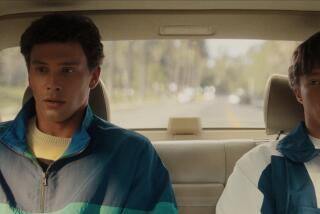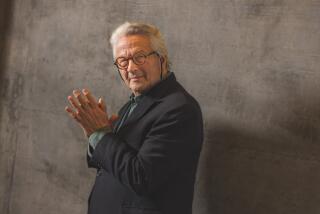‘Rushmore’: Pest-as-Hero Theme in Mountain of Eccentricity
- Share via
Max Fischer is one strange kid, and “Rushmore,” the ode to teenage dementia that is his story, matches him in eccentricity. Like the best filmmakers, director Wes Anderson has an idiosyncratic sensibility, the rare ability to create a world that is completely his own. Unique worlds, however, can be off-putting enough to discourage civilians from spending time there. And that is the case with “Rushmore” as well.
Anderson’s first film, co-written (as “Rushmore” is) with actor Owen Wilson, was the charming independent hit “Bottle Rocket.” “Rushmore” is considerably more ambitious and impressive, but while it has some of its predecessor’s blithe charm, it also has a protagonist it takes an act of will to care about.
That would be Max (newcomer Jason Schwartzman), a fixture at snooty Rushmore Academy since Grade 2 and now a 15-year-old 10th-grader. The film opens with a nerd’s fantasy of academic heroism and hearty camaraderie, and it’s easy to see why Max takes refuge in dreams. Saddled with braces and a chipmunk manner, peering nearsightedly from behind black-rimmed glasses, Max covers up his understandable insecurities with a whining bravado and a grinding self-mythologizing.
Though his father’s a modest barber named Bert (an appealing Seymour Cassel), Max says his dad’s a neurosurgeon. Though Max’s grades (a 37 in geometry is a typical example) threaten to get him expelled, he insists he’s so solid academically that he looks on Harvard as his safety school.
What Max throws his life into instead of classwork are his extracurricular activities. Assisted by alter ego and protege Dirk Calloway (Mason Gamble of “Dennis the Menace”), Max is, among many other things, the driving force behind the stamp and coin, chess and calligraphy clubs, captain of the fencing team, president of the Rushmore Beekeepers, founder of the Dodgeball Society and director of the Max Fischer Players. When he says he’d like to stay at the school for all time, you believe him.
Monomaniacal enough to make people uncomfortable, getting increasingly off-putting the more he tries to please, Max finds an unexpected soulmate in the father of hulking twin classmates Ronny and Donny Bloom. Balding, pot-bellied, with a cigarette taking up permanent residence in the side of his mouth, the senior Mr. Bloom (Bill Murray) is a captain of industry gone to seed, a worn-out titan who admires Max as “a sharp little guy.”
Mr. Bloom is not the only adult to penetrate the Stygian depths of Max’s obsessive adolescence. Max becomes completely infatuated with Miss Cross (Olivia Williams, recovering nicely from being Kevin Costner’s love interest in “The Postman”), a first-grade teacher at Rushmore.
While love brings some people out of themselves, it makes Max more like the worst aspects of himself. He becomes, frankly, an impossible person, self-involved, oblivious, malicious and mendacious. “Rushmore was my life,” he says to Miss Cross in a rare moment of honesty. “Now you are.”
Anderson brings a lot of appealing gifts to “Rushmore,” including the ability to construct a film with an unpredictable dramatic arc. He’s gotten the entire cast to function beautifully on his particular wavelength and elicited a fine, bittersweet performance, one of his best ever, from Murray. And then there are the out-there plays Max puts on, from a stage version of “Serpico” to a wild Vietnam drama, all wonders to behold.
But you can’t have “Rushmore” without Max, and though Anderson obviously planned it this way, the kid is finally too off-putting to tolerate. The Pest as Hero is an interesting concept, and Max certainly has real-world correlations, but wondering if and when and how he’s going to grow up is too precarious a journey to undertake without some serious reservations.
* MPAA rating: R, for language and brief nudity. Times guidelines: a teenage hero obsessed with sex with a teacher.
(BEGIN TEXT OF INFOBOX / INFOGRAPHIC)
‘Rushmore’
Jason Schwartzman: Max Fischer
Bill Murray: Mr. Bloom
Olivia Williams: Miss Cross
Brian Cox: Dr. Guggenheim
Seymour Cassel: Bert Fischer
Mason Gambl: Dirk Calloway
An American Empirical Pictures/Barry Mendel production, released by Touchstone Pictures. Director Wes Anderson. Producers Barry Mendel, Paul Schiff. Executive producers Wes Anderson, Owen Wilson. Screenplay Wes Anderson & Owen Wilson. Cinematographer Robert Yeoman. Editor David Moritz. Costumes Karen Patch. Music Mark Mothersbaugh. Production design David Wasco. Art director Andrew Laws. Set decorator Alexandra Reynolds-Wasco. Running time: 1 hour, 33 minutes.
Selected theaters.
More to Read
Only good movies
Get the Indie Focus newsletter, Mark Olsen's weekly guide to the world of cinema.
You may occasionally receive promotional content from the Los Angeles Times.











